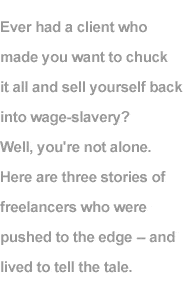 |
|
||||||||||||
 |
|
||||||||||||

|
 |
|
By Kim A. O'Connell
|
Sue Dodge is one sweetheart of an IP. As a graphic designer in Alexandria, Va., Dodge doesn't just work: she works to make the world a better place. One of our more PC IPs, Dodge freelances almost entirely for environmental organizations whose mission she endorses -- and her clients are often her friends. Consequently, Dodge usually operates without a written contract. Most of the time, she's on the job with just a handshake or a verbal agreement. Friends and clients toss out California-flavored adjectives when asked to describe Dodge: she's easygoing, committed, friendly. In short, a honey bear. But, once upon a time, a difficult client made her feel more bearish than sweet. Not a Gentlewoman's Agreement Recently, a client -- a high-powered scientist -- took advantage of Dodge's trust. The scientist hired Dodge to edit and design a 30-page report about environmental issues in third-world countries. The two had collaborated once before, and all had gone well. Dodge looked forward to the new job. Dodge was to do some major editing and lay out the report in WordPerfect. (As any graphic designer will tell you, "designing" within the limited confines of word-processing software isn't a piece of cake.) She kept her client informed at every step along the way, and the client was pleased with the work. Late in the project, however, the client developed computer problems, and instead of calling a technical person, she called Dodge. Several times. Soon Dodge became a regular visitor to the client's house. The scientist was virtually computer illiterate and expected Dodge to hold her hand in getting the computer to work properly and transmitting the report via email to colleagues around the world. When the gig was over, Dodge billed the client for more than the original estimate, arguing that she had done more than the established assignment. The client refused to pay -- and then complained that Dodge had made several editorial errors that hadn't been mentioned before. "When it came time to pay the bill, she acted as if my time wasn't worth much and that she shouldn't have to pay for anything beyond the original estimate," says Dodge. "By the time the report was finished I felt as if she viewed me as her slave, even though we were roughly of the same generation and both well-connected in the environmental community." At that point, Dodge was ready to fly the white flag. The client's attitude was horribly demeaning, and it threatened to crush Dodge's easy-going spirit. Dodge suddenly longed for the security of having an organization to help her resolve disputes (and fix her computer and pay for health insurance) -- and it seemed for a moment like one more bad project would be one too many. What stopped her from joining the corporate crush? Remembering the simple things. "Sleeping in, setting my own dress code, the freedom during the day -- the fact that my hours are my own," Dodge says. "When you weigh it all, it's worth every hassle that comes along." Men's Intuition Tom Russ, an independent landscape architect based in New Freedom, Pa., had a funny feeling from the beginning about his nightmare project. A few years ago, a client approached Russ about developing a plan for a site that had several difficulties, including steep grades and poor access. As he developed the sketch plan for the site, he realized that this was going to be a rocky assignment. (Little did he know!) When his work was done, he submitted a bill. Weeks later, when he still hadn't received a check, Russ called the client to find the number disconnected and the client MIA. He was ready to chalk it up to a learning experience and move on. But over the next weeks and months, Russ was contacted by other developers who had been sold an interest in the project based on Russ's sketches. They demanded answers that Russ didn't have himself. "Not only did I not get paid, I ended up meeting a number of potential clients for the first time under terrible circumstances, and spent more time explaining my role and innocence than I had working on the project," he says. The circumstances were not only deeply frustrating, but Russ actually started questioning his own judgment. Every new contact seemed potentially suspect, and his entire career seemed to be on shaky ground. He wondered if he should even continue as a free agent. "I had known, somewhere inside of me, that [the deadbeat client] was a bad actor, but the excitement of the big job, the big opportunity, was more than I was able to resist," Russ says. "Perhaps in a firm, partners or peers would have whispered in my ear not to 'go there,' but as a single entity, I fell for the bait. "When the subsequent contacts were made, I had to approach each one as a potential client, and I had to stand behind the purpose and character of my work regardless of how badly my original client had behaved," he says. "The only real experience any of those subsequent contacts was going to have with me was how I dealt with the problem. I expressed my frustration and anger to a few close friends and colleagues, but not to the world." When Russ gets a job now he lays out the specific tasks and milestones, including when he is supposed to get paid. When he sends the bill, he calls a few days later to ask if the bill has been received (which avoids the response, "We never received the bill"). And, he adds, "I've learned to listen to my intuition." When a Man Doesn't Love a Woman Intuition helps in other fields, too. For nearly 12 years, Dave Clem has had a successful home-based business as a wedding photographer in McLean, Va. The hours are great, the clients are usually in happy, champagne-fueled moods, and every bride is beautiful. Clem specializes in "storybook" weddings, which often include time-intensive photo shoots with the bride, groom, parents, wedding party, and guests before, during, and after the ceremony. Sometimes these shoots involve visits to the house, the church, the reception hall, and an outdoor venue, all in the span of several hours. The pace is fast, Clem says, and usually quite rewarding. But not always. Not long after he had decided to give wedding photography a go full-time, Clem shot an event that made him re-consider. It was an elaborate affair, with the bride wearing a designer gown that "extended for miles," Clem recalls. There was one problem, however. The groom didn't show up -- at least initially. Once the groom was located and persuaded to say, "I do," he proceeded to virtually ignore his new wife at the reception, preferring instead to hang out with the band. The bride, however, was raising a few red flags of her own. She worked in a bridal shop, and seemed to Clem to be more interested in how she looked and how her store was being represented than in the importance of the day. "It was a strange circumstance," says Clem. "You can get the feel for which couples are going to last." Sure enough, within a month the marriage had dissolved. Clem's problem arose when the father of the bride then called Clem to renege on their photography agreement. For Clem, it wasn't just a mild annoyance. He invests a lot of time and emotional energy in preparing to photograph a wedding. He gets to know the couples, their love stories, their fears, their nerves. He gets caught up in their excitement and in the romance. Then he watches their lives begin to unfold as the couple takes the next few months or year to order photo albums and additional pictures. When the father of the bride called, he was abrupt. He stated that the couple had split and that he would not pay the remainder of the bill. End of story. Clem was left with the disappointment -- not just that he would not get fully paid for shooting what was a huge, time-consuming wedding, but disappointment about something much deeper and less tangible. He felt sorry that so many people were now unhappy -- the family, the guests, and himself -- who only weeks before had the highest expectations. He didn't know if he would be able to handle the letdown if other weddings were to turn out that way. Thankfully, Clem persevered, and after coming to a settlement with the father of the bride, has since found that the vast majority of weddings are the wonderful beginnings one imagines them to be. He revels in his ability to be present at that moment. "The fact that you're dealing with a happy occasion, filled with joy -- that moment when the best man waxes on about this friend that he lived in the dorm with -- you get caught up in it," he says. "When the father and daughter do their dance, even my eyes start to water." Maybe that's the answer. When the going gets tough, IPs need to maintain a cool head and a soft heart. They need to trust that clients are not idiots or greedy monsters or selfish, untalented, manipulative bastards, but are as intrinsically good as any freelancer. At least until proven otherwise. |
|
|
| ||
|
February 20, 2000 Primary Editor: Ken Gordon Illustrator: Steve Smallwood Production: Keith Gendel |
We'd love to hear your comments about this article! Kim O'Connell is an environmental journalist based in Arlington, Va., who writes freelance articles on the side when she's not working to save the planet. | |
| ||